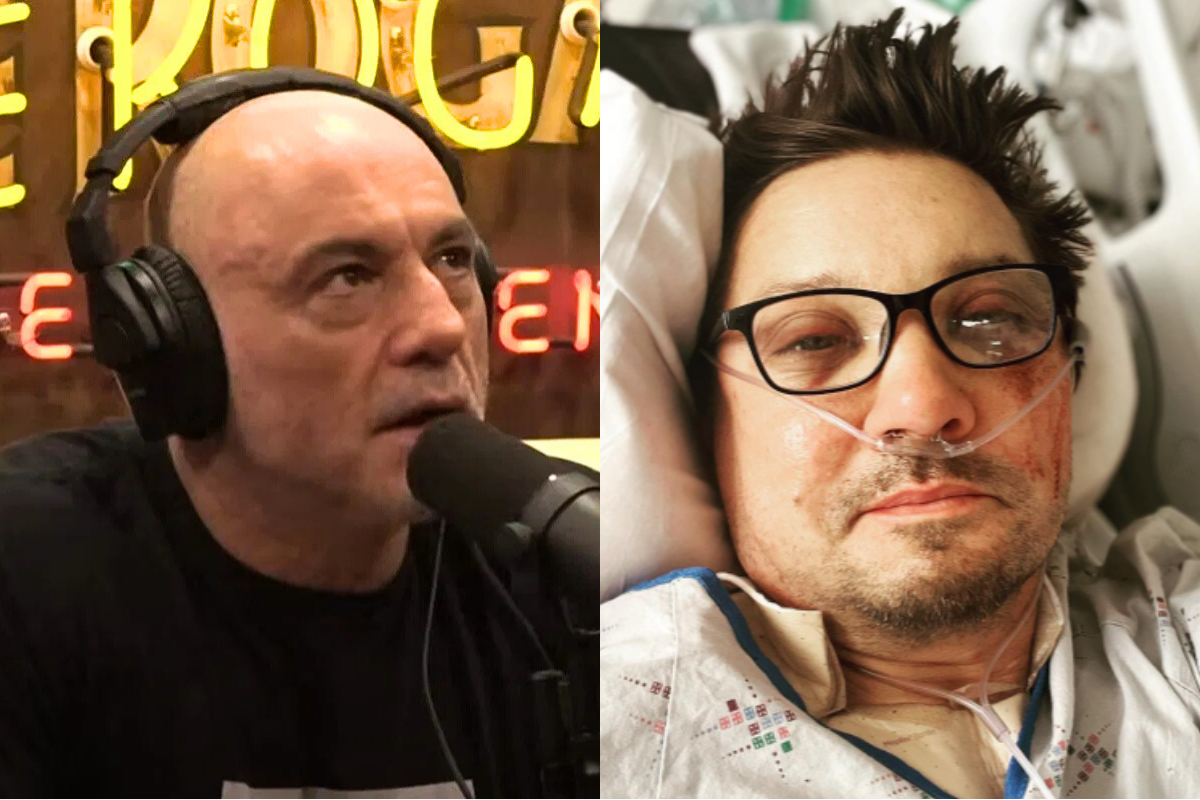
Imago
Credits: YT

Imago
Credits: YT
When Jeremy Renner joined Joe Rogan, fans anticipated tales of recovery and resilience. Instead, listeners received an emotionally raw and at times technically precise breakdown of one of the most traumatic injuries ever tackled, on the podcast. UFC fans, action movie enthusiasts, and those who grasp the intricacies of physicality were all drawn in.
Watch What’s Trending Now!
Renner, famous for his roles in action-packed franchises like The Avengers and The Hurt Locker, recounted the harrowing moment when a 14,000-pound snowcat crushed his body. The fight world knows the toll injuries take, and that’s where Renner’s story really hits. He started talking about his brain, which scares even elite athletes.“All my organs, my brain, I don’t think there’s any brain damage,” he said. He clarified, “I’ll use that as an excuse later I guess,” eliciting a moment of dark humor that momentarily lifted the weight in the studio. But Rogan didn’t laugh it off. He paused. The gravity of the injuries wasn’t lost on him.
ADVERTISEMENT
Then, what he said was unbelievable. “That’s the miracle… it’s like how did I break 14 ribs right and my crack my skull and every arm and leg and finger and thing but my spine was spared… oh my god and and all my organs were spared—my brain. And so like it’s kind of almost no harm, no foul at the end of the day even though there’s, you know, probably 20% titanium in my body at this point”
For fans immersed in the UFC scene, those who have witnessed fighters battle through torn ligaments, orbital fractures, and concussions, this segment sparks essential questions: Is Jeremy Renner facing cognitive impairment that could jeopardize his career? Could he think, react, and adapt like a true fighter? How much of what he’s describing can actually be survived, or even reversed? Answers arrived with depth when he provided specifics to Joe Rogan.
ADVERTISEMENT
The brain damage that Renner underwent was functional. “I needed my mind, if I need my wit, I needed my will to to recover, I needed sleep and I needed my brain and the dr*gs kind of numb my brain, as they would, right, as they numb your whole body, so I just wanted off of them and I don’t like how… I feel… you feel muddy.”
ADVERTISEMENT
View this post on Instagram
Renner’s spine and brain remained structurally untouched. Such a fact would leave any sports physician in disbelief. He didn’t escape unscathed. He describes functional disruption, invisible on a scan, yet felt in every foggy moment. He needed his brain to come back online, to tackle the complex, painful rehab that engaged every joint and muscle. Fans who regularly see fighters rebound from injuries know this: mental sharpness is essential for survival. He said the drugs dulled him. He weaned off, but because it dulled the very tool he relied on the most. It was a complete system reboot, entirely under manual control.
ADVERTISEMENT
“Had to get off that stuff real quick” — Jeremy Renner’s brutal withdrawal from pain meds
Some things hit harder than a 14,000-pound snowplow. For Jeremy Renner, one of the toughest battles came after the surgeries, long after the bones were pinned and ribs wired. It came in the form of a little white pill meant to ease the pain—OxyContin. Renner didn’t sugarcoat it. “One of the harder things worse than the accident as well is getting off Oxycottton and I got off pretty quickly,” he told Rogan on episode #2312 of The Joe Rogan Experience. “That’s gnarly stuff man. I’m glad it was there for, you know, the pain for me, but like I wanted to get off it as soon as possible.”
Rogan knew exactly where that was going. Few topics stir more outrage on his show than the pharmaceutical disasters tied to painkillers. “That’s crazy dude,” Rogan replied. “They put all people on that stuff.” Renner nodded, “I had to get off that stuff real quick.”
ADVERTISEMENT
For fans wondering if Renner knew what was happening at the time, he didn’t. “I wasn’t thinking that anything other than like, why am I crying? I didn’t know it was withdrawal even though… my mind’s in recovery and getting off this stuff and focusing on holding my body up.”
That led to a striking reflection that anyone recovering from trauma or training through pain might recognize: the body can be managed, but the mind doesn’t always follow. “It takes just a lot of mental people on that stuff to just exist,” he said. “Of course I look back on [it]—I was like, of course I’m coming off f**king her**n essentially.”
ADVERTISEMENT
Is OxyContin still being prescribed? Why did Renner even need it? These are natural follow-ups. Yes, it’s still legally prescribed in post-surgery recovery across the U.S., especially for cases as extreme as Renner’s. Doctors turn to it because its potency buys time. But that short-term relief comes with long-term consequences, which Renner illustrated without mincing words: “It’s terrible. Wow. But it’s pretty powerful, powerful stuff. And I don’t ever blame sort of the dr*g. I just think, sort of, how maybe it’s free to use and it’s even supported in school systems.”
For a man who just survived a multi-system trauma, his clarity in hindsight is piercing. Joe Rogan and Jeremy Renner are surprised how the dr*g has been prescribed without the caution that it requires. It’s now time for fans to step in and put words to their thoughts.
ADVERTISEMENT
ADVERTISEMENT
ADVERTISEMENT